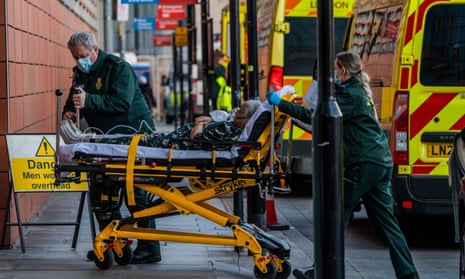UK hospitals have cancelled at least 13,000 operations over the last two months as they struggle to cope with record demand for NHS care and people sick with Covid-19.
Figures collected by A&E doctors showed that 13,061 planned surgeries had to be called off during October and November because of shortages of beds and staff.
However, the cancellations occurred at just 40 of the several hundred NHS hospitals across the four home nations, so those 13,061 are likely to be a major underestimate of the scale of the problem.
Dr Adrian Boyle, a vice-president of the Royal College of Emergency Medicine (RCEM), which published the data, said the cancellations represented “a stark warning for the months ahead”.
He also warned that A&E units across the NHS are “verging on crisis” because of their growing inability to provide timely care to the increasing numbers of patients seeking help. “Urgent and emergency care is verging on crisis and it is impacting and derailing elective care, meaning surgery for patients with serious conditions is delayed,” he added.
A combination of record demand and hospitals’ difficulties in discharging patients who are medically fit to leave is causing what A&E doctors call “poor patient flow” and “exit block”, when A&Es cannot treat and admit patients quickly enough because there are too few beds for them.
“These blockages cause ambulance handover delays, crowding [in A&E] and corridor care,” added Boyle.
The findings are contained in a new report from the RCEM’s “winter flow project”, which uses key data from 40 unnamed hospitals to show the pressures that the NHS comes under every winter.
Even before the Omicron variant of Covid emerged two weeks ago Prof Chris Whitty, England’s chief medical officer, had warned that this winter “is going to be exceptionally difficult for the NHS” because of the persistently high number of people getting infected with coronavirus.
Amanda Pritchard, the chief executive of NHS England, told health service bosses last month that “the science suggests [it] is going to be tough for a while”, because of the growing strain on all services, which is compounded by the service in England having almost 100,000 vacancies.
The RCEM recently estimated that thousands of patients a year die – in ambulances outside hospitals, in hospital after admission or in their own homes – as a direct result of overcrowding in A&E and the sheer number of ambulance crews tied up outside.
“It is very alarming that more than 13,000 planned operations were cancelled in the past two months alone,” said Prof Neil Mortensen, the president of the Royal College of Surgeons of England.
“This means thousands of patients who had prepared themselves for vital hip, knee and other types of planned surgery were left waiting in limbo for their treatment. NHS staff are working flat out. But, as this report shows, there simply are not enough hospital beds to meet the huge demands we are seeing in the wake of the pandemic.”
He added: “The NHS is staffed by world-leading doctors and nurses. They cannot care for patients properly with a bed base the size of a postage stamp.
The British Medical Association, Royal College of Nursing and the NHS Confederation have all warned in recent weeks that the service’s increasing fragility is putting patient safety at risk.
The cancellations will affect the size of the backlog of people waiting for non-urgent care in a hospital in England, which last month reached a record 5.83 million.
“It is not good enough for thousands of people in need of operations to have them cancelled, forcing them to wait longer, often in pain and discomfort,” said Wes Streeting, Labour’s new shadow health and social care secretary.
“Waiting lists are already at record levels, yet the government has no plan to address the chronic shortages in GPs, doctors, nurses and social care staff.
The emergence and growing threat posed by Omicron last week forced NHS England and the Department of Health and Social Care (DHSC) to postpone publication of their “elective recovery plan”, detailing plans to tackle the backlog.
The RCEM’s report also found that:
The percentage of people spending at least 12 hours in A&E is double what it was this time last year.
Only 62% of those attending A&E are seen within four hours – it should be 95%.
Long stays in hospital are rising despite the pressure to discharge patients.
DHSC has been approached for comment.
